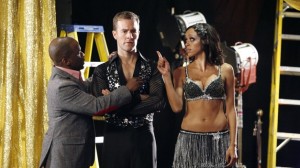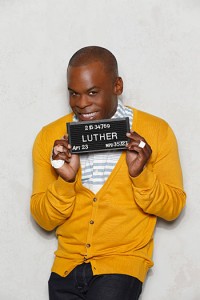The Cancellation of Don’t Trust the B and Gay Black Tele(in)visibility
The cancellation of Don’t Trust the B in Apartment 23 came as news to few people (although it had its fair share of fans who bemoaned its cancellation). On January 13, a paltry 1.76 million viewers tuned it see the show and by January 22, its network, ABC, announced that it was (mercifully) putting the show out to pasture. To my mind, little was remarkable about Don’t Trust the B except that it featured a gay black character – a rare species in network television fare. Luther, played by actor Ray Ford, was the series’ gay black character, who was the assistant to James Van Der Beek (playing a version of himself).
Don’t Trust the B received little attention. Clearly, not many viewers tuned in to watch the series (thus resulting in its cancellation). And few stories were written about the series after its initial televisual introduction with the majority of recent stories revolving around Luther’s promotion to series regular for the series’ second (and final) season. The series has been met with virtual silence from the Gay and Lesbian Alliance Against Defamation (GLAAD), the self-appointed organization that polices gay representation. The series failed to garner a nomination for the organization’s GLAAD Media Awards, whose aim is to celebrate “images that moved [lesbian, gay, bisexual and transgender people] closer to equality.” So, what was wrong with Don’t Trust the B? Part of what was “wrong” with the show is that Luther was not a “respectable” homosexual subject. Sure, he was professional (he was Van Der Beek’s assistant), but not only was he single (which seems to increasingly be a no-no in gay televisual representation), but he also embodied far more hegemonically (and problematically) feminine traits. With series like Modern Family, The New Normal, and the now-cancelled Partners, the more “masculine” characters temper the more “feminine” characters. But Luther is the only gay in the village and as such, his feyness is untethered to “respectable” straight-acting homosexuality. He typically prances and preens his way through scenes and provides some of the series’ comic relief – a break from the ways gay characters have been imagined in recent years. In some ways, he also embodies the lecherous homosexual subject. He secretly (and sometimes not so secretly) lusts after Van Der Beek and in his “diary” on ABC.com, Luther celebrates the success of a billboard featuring Van Der Beek and suggests that now the world gets to “see what [he] see[s]… the tight package of a beautiful creature… James Van Der Beek.”
For his embodiment of so-called “negative” stereotypes, one would think that I would be suggesting that we keep Luther safely locked away in television’s closet, never to be seen or heard from again. Quite the opposite, I believe Luther is far more important representationally than he has been (and likely will be) given credit. Long after the cultural memory/DVD archive has forgotten that there was even a show on the air called Don’t Trust the B, we should remember Luther.
 Luther is/was an important contribution to the network television canon of gay black characters for three reasons: first, he creates visibility for a population largely ignored on television (although, black gay men were likely not watching the show en masse). As a run through the canon of gay and lesbian characters on television demonstrates, very few of those characters are of color. The list of usual suspects include Jodie Dallas on Soap, Ellen Morgan on Ellen, Will Truman and Jack McFarland on Will & Grace and Cameron and Mitchell on Modern Family, thus reinforcing Richard Dyer’s assertion in his book White that “to be gay… is to be white.” Second, while I will not suggest that network television will ever educate viewers about gay culture, there was always something campy about Luther and his writer’s willingness to let him trend toward embodying more “feminine” characteristics and being proud of his feyness. Third, Luther was actually portrayed by an out black gay man, which alone is cause for celebration. Excepting the men of Noah’s Arc, those black actors who have portrayed gay characters on television have been heterosexual. I am not suggesting that these actors did a bad job at “playing” gay, rather I am suggesting that in Hollywood, with few exceptions, out gay actors are often understood as incapable of convincingly playing heterosexual characters, while concomitantly, because of their personal lives, are “too gay” to actually play gay characters, and thus unable to work in Hollywood.
Luther is/was an important contribution to the network television canon of gay black characters for three reasons: first, he creates visibility for a population largely ignored on television (although, black gay men were likely not watching the show en masse). As a run through the canon of gay and lesbian characters on television demonstrates, very few of those characters are of color. The list of usual suspects include Jodie Dallas on Soap, Ellen Morgan on Ellen, Will Truman and Jack McFarland on Will & Grace and Cameron and Mitchell on Modern Family, thus reinforcing Richard Dyer’s assertion in his book White that “to be gay… is to be white.” Second, while I will not suggest that network television will ever educate viewers about gay culture, there was always something campy about Luther and his writer’s willingness to let him trend toward embodying more “feminine” characteristics and being proud of his feyness. Third, Luther was actually portrayed by an out black gay man, which alone is cause for celebration. Excepting the men of Noah’s Arc, those black actors who have portrayed gay characters on television have been heterosexual. I am not suggesting that these actors did a bad job at “playing” gay, rather I am suggesting that in Hollywood, with few exceptions, out gay actors are often understood as incapable of convincingly playing heterosexual characters, while concomitantly, because of their personal lives, are “too gay” to actually play gay characters, and thus unable to work in Hollywood.
So as we bid farewell to Don’t Trust the B, we also bid farewell to a part of gay black visibility on network television. Luther was a character written in a mold that has (problematically) been deemed passé and disrespectful to the middle class, married/coupled, suburban model of gay televisibility. And for that, we should be saddened.




[…] “The Cancellation of Don’t Trust the B and Gay Black Tele(in)visibility” by Alfred L. Martin […]